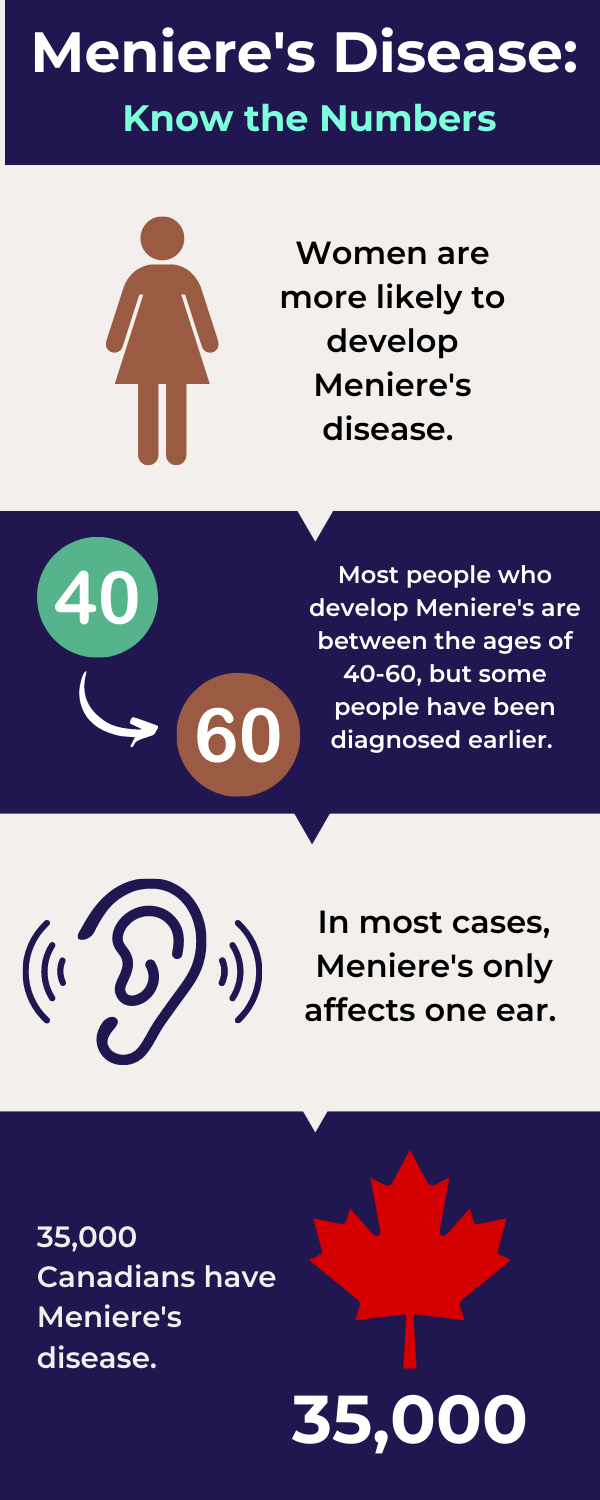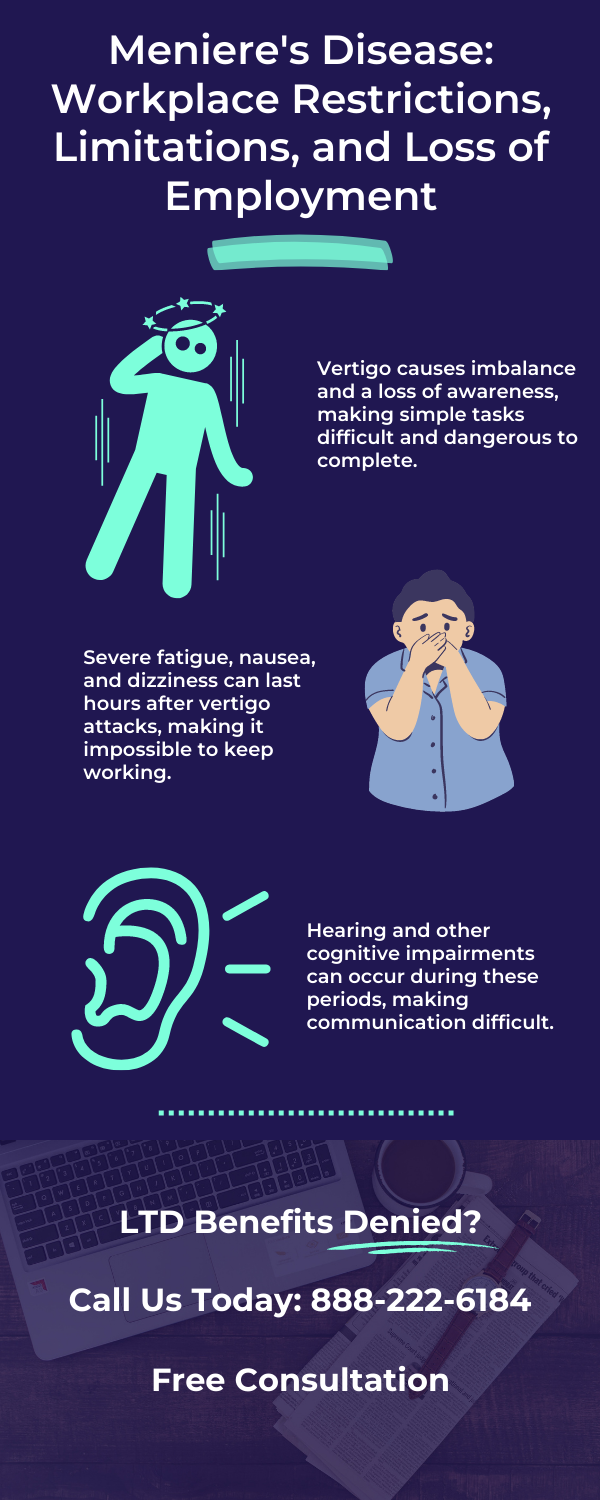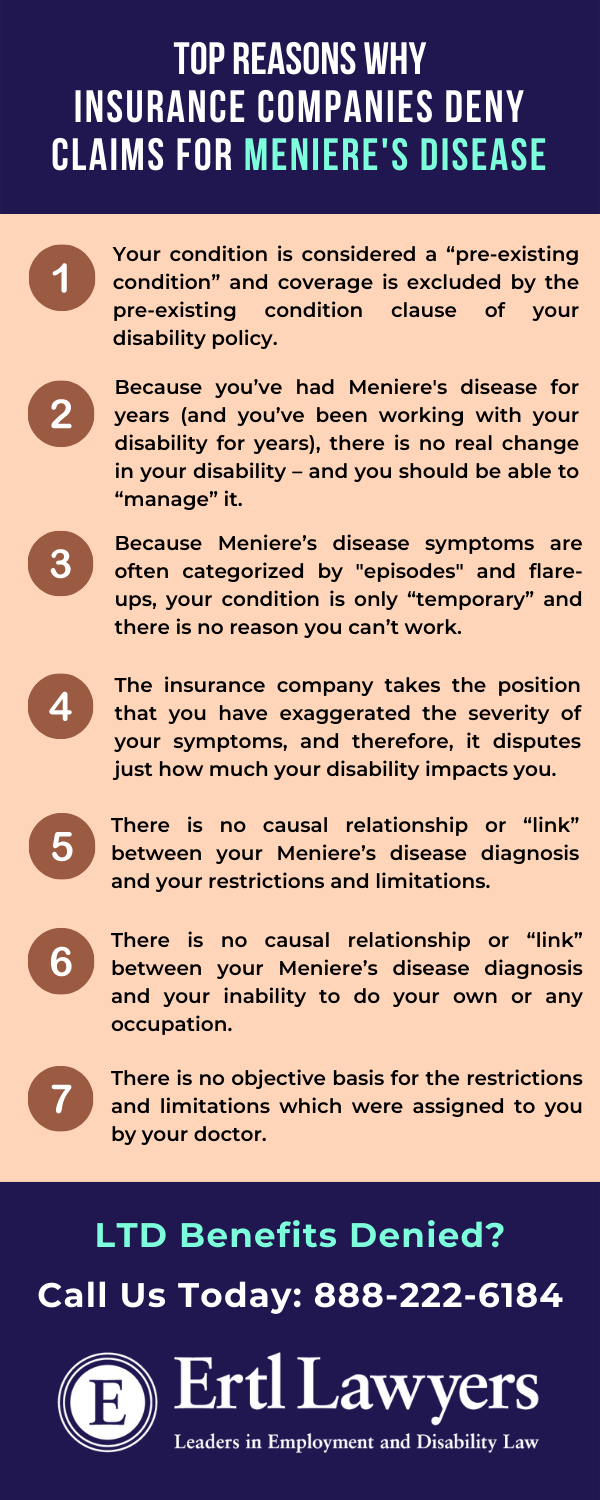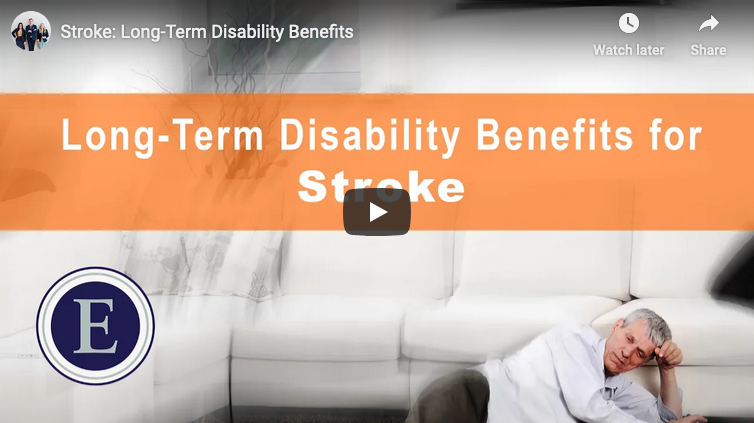Do I Qualify for Long-Term Disability Benefits if I Have Meniere’s Disease?
Can I Get Long-Term Disability Benefits for Meniere’s Disease?
One of the most common questions we get is “Do I qualify for long-term disability benefits if I have Meniere’s Disease?”
Meniere’s Disease is a chronic disorder of the inner ear that causes recurring episodes of vertigo, hearing loss, and ringing and can have a significant impact on a person’s employment and daily life.
Therefore, Meniere’s Disease can qualify for long-term disability benefits – provided it is not excluded by your insurance policy wording.
LTD Denied? Which Category Do You Fit In?
Category 1: The insurance company denied your initial claim for disability benefits for Meniere’s Disease.
Category 2: The insurance company denied your appeal.
Category 3: The insurance company discontinued or terminated your benefits.
What Can We Do For You?
We’ll work with you and your physician to help challenge the insurance company’s denial or discontinuance of your long-term disability benefits.
Where necessary, we will engage other trusted professionals to support your case including specialists, functional capacity evaluators, and vocational evaluators to help credibly explain why your disability symptoms are preventing you from doing your “own occupation” or “any occupation”.
Our Help Can Make All The Difference. How?
- Over 25 years’ combined experience getting our clients the benefits they deserve.
- Expertise in both disability and employment law (your employment status is directly linked with your disability)
- We offer a free case assessment
- We offer flexible rates, including contingency fees (i.e., only pay if you win)
- Service across all of Ontario


Meniere’s Disease: Overview
Meniere’s disease is a chronic condition that is caused by an abnormal amount of fluid in the inner ear.
People with this disorder experience dizzy spells and hearing loss that progressively worsen as fluid accumulates and fills the inner ear.
Meniere’s disease is an inflammatory illness. When there is too much fluid (endolymph) within this specific area of the brain, swelling and balance signals can occur, resulting in Meniere’s disease.
Usually, only a single ear is affected but it can spread to both.
The cause of Meniere’s disease remains unknown, though scientists have their theories.
Some suggest:
- constrictions in blood vessels
- drainage issues
- anatomic abnormalities
- viral infection
- genetics
Intensity of the symptoms are variable from person to person. The first symptoms most people experience are periods of vertigo, while others lose hearing first.
The only consistency is the unpredictability of attacks, the severe vertigo caused by this condition.
Meniere’s disease often co-exists with migraines and other types of headaches.

Most Common Symptoms of Meniere’s Disease
Meniere’s Disease is mainly associated with:
Vertigo: a spontaneous spinning sensation that makes a person feel unsteady. It can last anywhere from twenty minutes to several hours and can cause severe nausea and vomiting.
Hearing loss: hearing comes and goes, but eventually, most people have permanent hearing loss.
Ringing (tinnitus): a ringing, buzzing, or roaring noise in your ear.
Other symptoms can include:
- Full, congested feeling in the ear
- Headaches’
- Loss of balance
- Sweating
Important: Many people with Meniere’s disease become discouraged, which can lead to depression and anxiety.
Criteria for a Diagnosis of Meniere’s Disease
There is no single test to confirm if you have Meniere’s disease. Doctors have to rule out other conditions to make a diagnosis, but there are now Canadian guidelines – provided by the The College of Family Physicians of Canada – to identify and manage the condition.
The main diagnostic criteria includes:
- Two or more spontaneous episodes of vertigo each lasting 20 minutes to 12 hours
- Documented sensorineural hearing loss greater than 30 dB below and above 2 kHz
- Fluctuating aural symptoms (hearing, tinnitus, and fullness) in the affected ear
- Not better accounted for by another vestibular disease [3]
Because a Meniere’s disease diagnosis is frequently misdiagnosed, long-term disability insurers often deny these claims.
Treatment for Meniere’s Disease
There is no cure for Meniere’s disease, however symptoms can be treated with medications, therapies and procedures, and surgeries.
Medication
Diuretics (e.g.diamox, dyazide) are commonly prescribed medications that restrict the overproduction of fluid (endolymph). They can reduce the number of vertigo attacks and prevent hearing loss.
Meclizine, Dramamine, and Valium are medications for the control of vertigo.
Noninvasive therapies
- Rehabilitation
- Hearing aid
- Positive pressure therapy
Injection therapies
Gentamicin, which is toxic to cells in the inner ear, is an injection procedure that works by targeting specific cells to reduce vertigo and preserve hearing.
Dexamethasone, a strong form of cortisone, is also available but isn’t permanent.
Surgical procedures
- Endolymphatic sac procedure
- Labrinthectomy
- Vestibular nerve section
Your Doctor may also suggest a low-salt diet, which can reduce fluid in the ear and help prevent vertigo. [4]

Meniere’s Disease & Your Employment

Workplace Restrictions Caused by Meniere’s Disease
When considering your employment and Meniere’s Disease diagnosis, consider how stable your condition is, how safe you are to do your job and what the demands are physically and mentally.
Many individuals suffering from Parkinson’s disease may experience headaches, vertigo, and nausea.
Meniere’s Disease and Workplace Discrimination
It is unlawful to discriminate against someone in the area of employment based on their physical disability: Ontario’s Human Rights Code and the Canadian Human Rights Act.
If you are suffering from Meniere’s Disease, you might face discrimination in a variety of ways:
- You experience employment termination because you have Meniere’s Disease.
- You are denied accommodation because of your Meniere’s Disease.
- After returning from a disability leave, your employer places you in a lower, part-time position at a lower rate of pay.
- Someone makes unwelcome remarks or jokes about your disability.
- Someone offends or humiliates you physically or verbally threatens or intimidates you because of your disability.
- Retaliating against you for filing a human rights complaint.
Ertl Lawyers are experts in Employment and Disability Law. If you have been discriminated against, our disability and employment lawyers in Toronto can help, including:
- Having your employer comply with their duty to accommodate you.
- Having your employer stop all forms of discriminatory conduct.
- Representing you in wrongful dismissal in Ontario, constructive dismissal, and human rights matters.
- Ensuring that your employer complies with its statutory obligations, including its obligations under the Employment Standards Act.
- Negotiation severance packages (including continuation of benefits).

Meniere’s Disease & Insurance Companies

Apply for Long-Term Disability Benefits for Meniere’s Disease?
Review Your Policy Carefully
Your entitlement to disability benefits for Meniere’s disease depends on the specific wording of your disability policy.
As noted, some policies outright exclude Meniere’s disease coverage or else consider it a “mental disorder” (and seek to limit the amount of benefits).
It is important that you understand how the insurance company defines things like “totally disabled,” “occupation,” “mental disorder, “self-reported condition” – and whether any exclusions apply (particularly for pre-existing conditions).
Bottom line: You need to know what your policy says before you apply for benefits.
Gather Medical Evidence
To be entitled to disability benefits for Meniere’s disease, every insurer requires you to provide medical evidence documenting your diagnosis and that your illness or injury causes restrictions or lack of ability, such that you are prevented from performing the essential duties of your occupation.
It is recommended that you get treated by a medical professional who will diagnose your condition using established criteria.
It is also recommended that you provide to the insurer results of any Functional Capacity Evaluation or cognitive testing that objectively documents your physical and (if applicable) mental limitations.
Gather Evidence of Workplace Limitations
Because your entitlement to long-term disability benefits for Meniere’s disease depends on the strength of your evidence, you should get a copy of your employee file from work. It may show that your Meniere’s disease has negatively impacted your work performance. Your work performance may have been affected by your pain, fatigue, cognitive impairment, or other symptoms.
Create a List of the Physical Duties of Your Job
You should get a copy of your job description. Based on that job description, you should write out a detailed list of the physical (and mental) duties associated with your job description – and explain how your Meniere’s disease limits or prevents you from performing you own occupation.
Follow Your Doctor’s Treatment Plan
Your entitlement to long-term disability benefits also requires you to be receiving regular, ongoing care and treatment for your Meniere’s disease. In other words, don’t skip appointments, and always follow your doctor’s treatment plans.
Keep a Pain Diary
On your end, it is important to keep a pain diary. A pain diary is a written record that helps you keep track of when you have pain, how bad it is, and whether your treatment is helping.
What Other Benefits Might I Be Entitled to for Meniere’s Disease?
Other than short-term and long-term disability benefits through a group or individual insurance plan, people suffering from Meniere’s Disease might be entitled to one or more of the following benefits:
- Employment Insurance (EI) Sickness Benefits;
- Ontario Disability Support Plan (ODSP);
- Disability Tax Credit (DTC);
- Disability Creditor Insurance (under your mortgage or credit cards);
- Trillium (extended health benefits);
- Canada Pension Plan Disability (CPP-D); and
- Disability Pension (employer).
Organizations / Associations / Colleges
- Meniere’s Society
- American Hearing Research Foundation
- Canadian Hard of Hearing Association
- National Organization for Rare Diseases NORD
Disclaimer: The content on this web site is provided for general information purposes only and does not constitute legal, medical, or other professional advice or an opinion of any kind. Users of this web site are advised to seek specific legal advice by contacting members of Ertl Lawyers (or their own legal counsel) regarding any specific legal issues. Ertl Lawyers does not warrant or guarantee the quality, accuracy or completeness of any information on this web site
Sources:
[1] https://www.mayoclinic.org/diseases-conditions/menieres-disease/diagnosis-treatment/drc-20374916
Long-Term Disability Benefits Denied?
Ertl Lawyers provides expert representation in long-term disability matters.
The vast majority of disability matters are resolved through negotiation and mediation – and that’s because insurance companies know that we are passionate about our clients’ rights.
How we can help you:
• free disability policy analysis
• free case assessment
• applying for disability benefits
• appealing a denial or termination of your benefits
• disputing a denial through a legal claim
• handling all communications with your employer
• protecting your employment
• prosecuting human rights claims
Fair, Flexible Rates – Including Contingency Fees
(Don’t Pay Unless You Win)
Our Help Can Make All The Difference.
Related Blogs
Examples of Disability Discrimination
Despite the best intentions of the federal government and provincial legislators, disability discrimination is still causing too many Canadians to be excluded from the basic necessities of life.If you are facing unfair and discriminatory challenges at work, speak with...
Understanding the Duty to Accommodate Laws in Canada
A duty to accommodate is an attempt to even the playing field in circumstances that inherently discriminate against a person based on grounds they have no control over and that are protected in several Canadian statutes. Protected (or prohibited) grounds typically...
What Qualifies for Long-Term Disability in Canada?
Long-term disability (LTD) benefits are paid out by insurance companies according to the policy purchased by a worker, their union/association or their employer, and each has specific rules regarding how you qualify for long-term disability benefits. The general rule...






